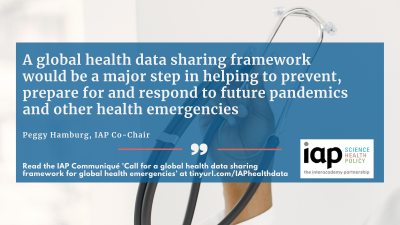


COVID-19 has brought into stark relief the urgent need for a global system to share health data to prevent, prepare for and respond to health emergencies. Such a data-sharing framework should be standardised, ethical, reliable, and accessible by all countries and governed by a trusted international organisation. In global health emergencies such as pandemics, surveillance, vital statistics, laboratory, clinical, socio-behavioural and public health data, as well as data from the health system, must be treated as a public good.
Today, the InterAcademy Partnership (IAP) issues a communiqué, ‘Call for a global health data sharing framework for global health emergencies’ that discusses the governance, operational considerations and skills required for such a framework to work to the benefit of all. Building on the March 2021 Statement issued by the G7 academies of science, the IAP communique makes recommendations to the World Health Organization, the World Health Assembly, to the health research community, and to philanthropic and educational institutions.
Among the challenges for building and maintaining such a framework are incentivizing and financing data sharing and building local capacity to collect, manage and analyse data. Further, there is a need to align relevant legal frameworks, including the International Health Regulations, the UN Convention on Biological Diversity (CBD) and the CBD Nagoya Protocol on Access to Genetic Resources and the Fair and Equitable Sharing of Benefits Arising from their Utilization.
An important new initiative by the WHO to address the urgent need for data sharing is the establishment, with the support of the German Government, of a new Hub for Pandemic and Epidemic Intelligence, tasked with coordinating data from multiple sources, developing new analytical tools, and supporting decision making by WHO and Member States to address health emergencies. In December 2021, the World Health Assembly initiated the negotiation of a global accord (sometimes referred to as a ‘Pandemic Treaty’) to help countries better coordinate for global health emergencies.
Salim Abdool Karim, a prominent epidemiologist in South Africa and the U.S., chaired the international expert group that developed the communique.
“Pandemics are not defined by national borders – an effective global response is dependent on each and every country sharing health data in a standardised manner for it to be readily available and accessible to all,” he said.
“A global health data sharing framework would be a major step in helping to prevent, prepare for and respond to future pandemics and other health emergencies,” noted Peggy Hamburg, IAP Co-Chair, former U.S. Food & Drug Administration Commissioner and internationally recognized public health leader.
Depei Liu, IAP Co-President, added, “The devastation caused by COVID-19, which affected almost every country in the world, has highlighted the urgent need to come together to share health data to prevent such a tragedy in the future.”
“The international coordination requirements for developing and executing such a global data sharing framework are significant, but the scientific research community and the independent merit-based academies can help advise how to make it most effective, transparent and inclusive,” concluded Richard Catlow, IAP Co-President.
The communique (available here) was endorsed by the Steering Committee members of the InterAcademy Partnership.
Note to editors: IAP presidents, co-chairs and Working Group members are available for interviews.
Under the umbrella of the InterAcademy Partnership (IAP), more than 140 national, regional and global member academies work together to support the vital role of science in seeking evidence-based solutions to the world’s most challenging problems. In particular, IAP harnesses the expertise of the world's scientific, medical and engineering leaders to advance sound policies, improve public health, promote excellence in science education, and achieve other critical development goals.
IAP’s four regional networks - AASSA, EASAC, IANAS and NASAC - are responsible for managing and implementing many IAP-funded projects and help make IAP’s work relevant around the world. More information about IAP can be found at www.interacademies.org, on Twitter at @IAPartnership, on LinkedIn and YouTube.
The full communiqué ‘Call for a global health data sharing framework for global health emergencies’ is available at https://www.interacademies.org/publication/call-global-health-data-sharing-framework-global-health-emergencies.
Giovanni Ortolani, IAP Communications Assistant
Email: gortolani@twas.org
